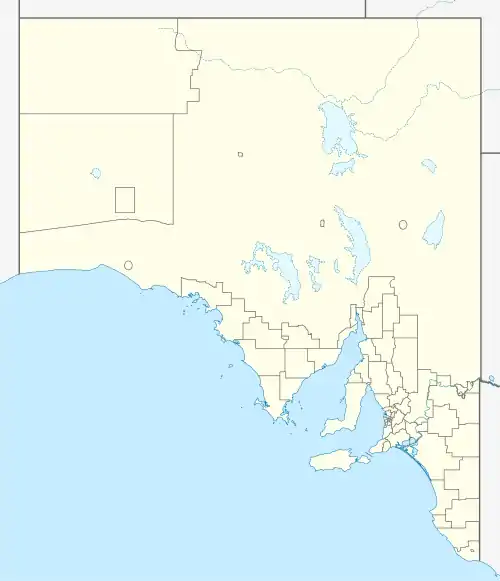| Booborowie South Australia | |||||||||||||||
|---|---|---|---|---|---|---|---|---|---|---|---|---|---|---|---|
 Booborowie | |||||||||||||||
| Coordinates | 33°33′46″S 138°45′45″E / 33.56278°S 138.76250°E | ||||||||||||||
| Population | 218 (2016 census)[1][lower-alpha 1] | ||||||||||||||
| Established | 1877[2] | ||||||||||||||
| Postcode(s) | 5417[3] | ||||||||||||||
| Time zone | ACST (UTC+9:30) | ||||||||||||||
| • Summer (DST) | ACDT (UTC+10:30) | ||||||||||||||
| Location | 200 km (124 mi) N of Adelaide | ||||||||||||||
| LGA(s) | Regional Council of Goyder | ||||||||||||||
| Region | Mid North[4] | ||||||||||||||
| State electorate(s) | Stuart[4] | ||||||||||||||
| Federal division(s) | Division of Grey[4] | ||||||||||||||
| |||||||||||||||
Booborowie is a locality in South Australia. It is located 200 km (124 mi) north of Adelaide. At the 2016 census, the Booborowie district had a population of 218.[1]
Booborowie Station
In 1843, Dr William James Browne and his brother Dr John Harris Browne took up the Booborowie run. In 1851 they purchased a crown lease of 153 square miles, and in 1853 the brothers purchased 46,978 acres of the lease.[5]
The Browne brothers established a merino stud and ran shorthorn cattle. They went on to purchase properties on the Adelaide Plains, at Mount Gambier, the Flinders Ranges, and the Eyre Peninsula, and were instrumental in establishing Katherine in the Northern Territory. This led to a large sheep and cattle drive, under the supervision of Alfred Giles, to leave South Australia in 1878.[5]
The northern portion of the station was sold to Henry Dutton and George Melrose in 1897. The remainder of the station was sold in 1910 and 1912 for closer settlement.
History of the township
Baldry Township was first surveyed in 1875 near Leighton, but was abandoned at the time. The Booborowie Township was proclaimed on 29 March 1877.
Being a farming community, the chief products produced are wool, wheat, lucerne and canola.
The town is named after the nearby Booborowie Waterhole, a small seasonal waterhole on Walton Palace Creek about 1 km (0.6 mi) north west of the town,[6] the "owie" signifying "waterhole" in the language of the indigenous Ngadjuri people, as in Hundred of Minlacowie, Terowie and Yarcowie (modern linguists tend to render the word as 'awi'). The spelling "Booboorowie" was common in the 19th century.[7]
A feature of the area is the "Camel Hump", a drystone wall which runs over 30 kilometres (19 mi) from Booborowie to Farrell Flat.[8]
The historic Booborowie Homestead and the former Booborowie Council Chambers are listed on the South Australian Heritage Register.[9][10]
Today, Booborowie is a popular destination for visitors enjoying the rural scenery, historic buildings and camping facilities at the town oval. The town is serviced by a primary school (opened 1892) with playgroup, and a grocer, incorporating hardware and post office facilities.
References
- Notes
- ↑ For the 2011 census, the 'State Suburb of Booborowie' consisted of the localities of Booborowie, North Booborowie and Mount Bryan.
- Citations
- 1 2 Australian Bureau of Statistics (31 October 2012). "Booborowie". 2011 Census QuickStats. Retrieved 17 January 2017.
- ↑ "Search result(s) for Booborowie, 5416". Property Location Browser. Government of South Australia. Archived from the original on 12 October 2016. Retrieved 8 April 2016.
- ↑ "AusPost".
- 1 2 3 "Search result(s) for Booborowie, 5417". Location SA Map Viewer. Government of South Australia. Retrieved 18 December 2020.
- 1 2 "Booborowie History Walk brochure" (PDF). 3 May 2016.
- ↑ "2905.0 – Statistical Geography: Volume 2 -- Census Geographic Areas, Australia, 2011". Australian Bureau of Statistics. Retrieved 8 December 2009.
- ↑ "Municipal Corporations". South Australian Register. Adelaide. 19 September 1874. p. 7. Retrieved 1 February 2013 – via National Library of Australia.
- ↑ Prue Adams. "Dry stone walls should be heritage listed". Australian Broadcasting Corporation. Retrieved 25 July 2015. The 65 km distance cited in this article is hard to corroborate.
- ↑ "Booborowie Homestead, Outbuildings, Stables, Shearing Shed and Water Tank". South Australian Heritage Register. Department of Environment, Water and Natural Resources. Retrieved 8 April 2016.
- ↑ "Former Booborowie Council Chambers". South Australian Heritage Register. Department of Environment, Water and Natural Resources. Retrieved 8 April 2016.